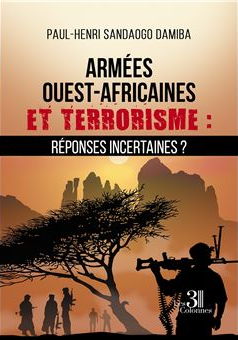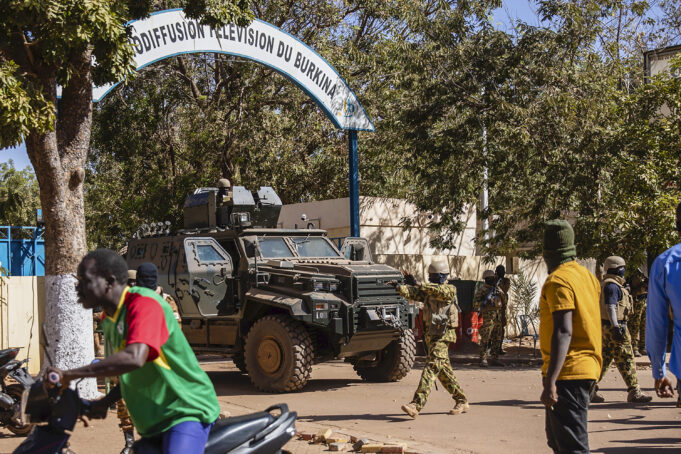Last year there were more coups in sub-Saharan Africa than at any time in the past two decades. January 24 in Burkino Faso marked the continent’s first coup of the new year. In the West African country, the military is now in charge after deposing a democratically elected president. The development comes amidst a string of coups on the continent, including the most recent in Guinea, Mali, Chad and Sudan.

The Financial Times published a November 2021 article, “Failure of democracy: why are coups on the rise in Africa.” The subtitle read: “As dissatisfaction with democratically elected leaders intensifies, militaries are extending their grip.”
In early January, the Economic Community of West African States (ECOWAS) slapped tough economic sanctions on Mali to punish coup leaders seeking to extend their hold on power, and to halt a run of military takeovers that have beset the region since 2020.
Burkina Faso’s military, obviously not getting ECOWAS 15-member states’ message, arrested President Roch Marc Christian Kabore and seized power.
As the global community condemned West Africa’s fourth coup in 18 months, crowds in the capital Ouagadougou cheered the Burkinabe army—a contrast to anti-coup protests that erupted when the military briefly seized power in 2015.
The reaction echoed scenes in Mali and Guinea, whose coup leaders received warm welcomes at home. Africa’s most recent coup leader, Lieutenant-Colonel Paul-Henri Sandaogo Damiba, has had first-hand experience with the brutal militant insurgency that he cites as justification for seizing power in Burkino Faso.
Damiba, according to the global news agency AFP, heads the junta that overthrew the country’s elected president, Kabore, who was facing public anger at his failure to stem the crisis. Since the first insurgent attacks in 2015, some 2,000 people have died, with the army, police and a civilian volunteer militia bearing the brunt of casualties.

The president’s “resignation,” reported BBC, purportedly written by the deposed president, was read on state TV in Burkina Faso after being toppled in the coup. The handwritten letter was shown on TV in a news bulletin on Jan. 24.
“With this letter, and in the best interest of the nation and following events that have taken place since yesterday (January 23), I have decided to resign from my position as president of Burkina Faso, head of the government, and supreme commander of the national armed forces. God Bless Burkina Faso,” the letter read.
The letter was addressed to the “president of the Patriotic Movement for Safeguarding and Restoration” or MPSR, the French acronym by which the junta is known.
As a contrast to Kabore, who has been faulted by the army for the rising rebel violence, Damiba has sought to present himself as an expert in countering terrorism. He studied at a military academy in Paris, obtaining a master’s degree in criminal sciences from the Conservatoire National des Arts et Metiers.
In June of 2021, Damiba published a book titled “West African Armies and Terrorism: Uncertain Responses?” in which he analyzed anti-terrorism strategies in the Sahel region, and its limits.
Contrast that with a recent Intercept report titled “Another U.S. Trained Soldier Stages A Coup In West Africa.” The report described Damiba as a “highly trained soldier, thanks in no small part to the U.S. military, which has a long record of training soldiers in Africa who go on to stage coups.”
According to Quartz Africa’s West African correspondent Alexander Onukwue, Burkina Faso had been trying to move on from the status of a 27-year dictatorship that ended when street protests forced Blaise Compaoré—who many blame for the 1987 assassination of President Thomas Sankara—to resign and go into exile in October 2014. In the year after that event, military officers staged a coup against an interim post-Compaoré government, before apologizing and returning power to that interim government. It allowed Burkinabes to elect and swear-in Kabore as the country’s third civilian president.
The current problems pre-date recent coups, reported wtvbam.com. Unlike its vocal opposition to military takeovers, ECOWAS remained silent as sitting presidents maintained their grip on power by extending terms under what critics call “constitutional coups.”
“Today, ECOWAS is not a credible institution to people,” said Abdoulaye Barry, a Burkinabe researcher at the United Nations’ University for Peace. “As long as they are not going to offer adequate responses to the governance deficit, coups are going to multiply,” he added.
Other countries, including France and European allies, as well as the U.S. under AFRICOM (U.S. Africa Command), have maintained a military presence in the region, and partner local armed forces to fight insurgent groups, meaning military support continues despite criticism of coups.
France in particular has deployed thousands of troops to West Africa’s Sahel region over the past decade, but security has progressively deteriorated, fueling anti-French sentiment.
The best response to why coups, came from Martin Ziguela, an opposition leader in the Central African Republic, a country that has had three successful coups. “You see young people out in the streets applauding the coup, why?” said Ziguela. He added,“In a country where you have no water, no electricity every day you’re asking, what is government doing to solve my problem?”
Follow @JehronMuhammad on Twitter.
itted and carry out a process of reparation,” the Venezuelan president insisted in his letter.
Mr. Maduro said that in order to achieve this demand, it was necessary to carry out “historical research” and “a great educational effort.”
He said the historical truth commission, which is chaired by Venezuela’s Minister of Culture, Ernesto Villegas, and made up of politicians, historians, writers, researchers, anthropologists, philosophers and leaders of Venezuelan cultural movements, has developed a line of documentary work on colonialism and that it is going to collect an “existing index of investigations” in this regard, both inside and outside Venezuela.
Mr. Maduro assured that it was “an effort to search for the truth with a view to justice and reparation.”
Mexican President Manuel Lopez Obrador on March 26, 2019, sent a letter to Spain and the Vatican asking them to apologize officially for Spain’s occupation of the Americas at the beginning of the 16th century and its crimes against the native population of the region. (Press.TV.com)













